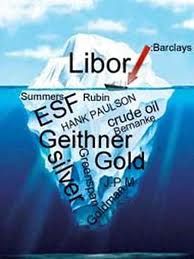Gaius Publius of Americablog succinctly defined one of those vague terms that we heard so often since the banking crisis began in 2007, Credit Default Swaps (CDS) :
Credit default swaps are pure casino bets. They were originally designed as a form of insurance against bond and other credit defaults (“I’ll pay you a monthly fee and you pay me my losses if these bonds default.”)
It’s a simple concept, but CDSs soon evolved. Turns out you don’t have to actually hold the bonds to insure them. This means that one guy can sit at a table with a bunch of bonds (or bundles of mortgages), while another guy can insure them. Meanwhile, at 50 other tables, 50 more guys can buy the same “insurance” on the same bonds from anyone who will sell it to them. Keep in mind, only the first guy actually holds the bonds. The other guys just know they exist.
That’s 50 side-bets on one set of bonds. Placing side-bets on someone else’s property is like betting on a ball game you’re just watching. Like I said, pure casino money.
Do you see the problem? One guy’s bonds default and suddenly 51 guys in that room, everyone who sold “insurance,” they’re all wiped out. Why? Because the dirty secret of derivatives bets is that the people offering the “insurance” rarely have the money. They’re betting that they can collect “insurance” fees forever and the defaults will never come. That’s what happened with mortgage-backed bets in 2007, and that’s what’s happening today.
In 2010, the Democratic held Congress passed the Dodd-Frank Wall St. Reform and Consumer Protection Act to rein in the worst practices of the banks and Wall St. Needless to say, it is overly complicated, inadequate and has yet to be fully implemented.
That has not stopped the now Republican held House, along with some Democrats, to end some of the regulations. Less that week after Sen. Carl Levin released a scathing report on the $6.7 billion loss (pdf) of JP Morgan Chase in the infamous “London Whale” deal, the House Agriculture Committee, go figure that logic, approved seven bills that would gut regulation of the derivatives market and once again, if the banks lose, the tax payer makes good the losses. Sound familiar? Does TARP ring a bell? The housing market crash?
In his Salon article David Dayen asks if JP Morgan is a farmer?
It turns out that the Agriculture Committees have held jurisdiction over derivatives since the mid-19th century, when farmers used derivatives to achieve stability over future prices. Traders still use derivatives for corn and other commodities, but the world of derivatives has grown far more sophisticated over the decades. Nevertheless, congressional committees zealously guard their jurisdictions, and so a bunch of lawmakers from rural states get to determine a major aspect of financial policy. [..]
To see how this all works, just look at the hearing on these derivatives bills, held last week. When Ag Committee chairman Frank Lucas wasn’t openly parroting industry scare tactics about energy price spikes from regulation, he called on a list of witnesses that included four industry trade group representatives and one public advocate from Americans for Financial Reform, Wallace Turbeville. (He did great (pdf).) Or for an even clearer indication, read these PowerPoint slides created for Ag Committee staff by the Coalition for Derivatives End-Users, an industry-backed lobbyist organization. This extremely one-sided perspective on the issue simply becomes the default position for committee members and their staffs, an example of the “cognitive capture” in D.C. that sidelines alternative voices. And it all happens under the radar.
One of the Democratic House members who is sponsoring these bills, is Rep. Jim Himes, a former Goldman Sachs vice president who represents the Connecticut bedroom communities of Wall Street traders. It’s not hard to imagine why he defended his support of these bills when asked by the press. The Democratic members of the committee who voted with the 25 Republicans to send these bills to the House floor are: Pete Gallego (TX-23); Ann Kuster (NH-2); Sean Patrick Maloney (NY-18); Mike McIntyre (NC-07); David Scott (GA-13); and Juan Vargas (CA-51).
These are the bills that were passed by the committee:
H.R. 634 (pdf), the Business Risk Mitigation and Price Stabilization Act of 2013
· H.R. 677 (pdf), the Inter-Affiliate Swap Clarification Act
· H.R. 742 (pdf), the Swap Data Repository and Clearinghouse Indemnification Correction Act of 2013
· H.R. 992 (pdf), the Swaps Regulatory Improvement Act
· H.R. 1003 (pdf), To improve consideration by the Commodity Futures Trading Commission of the costs and benefits of its regulations and orders.
· H.R. 1038 (pdf), the Public Power Risk Management Act of 2013
· H.R. 1256 (pdf), the Swap Jurisdiction Certainty Act
Even if these bills all get passed, they will never see the light of day in the Senate.
Sheila Bair, the longtime Republican who served as chair of the Federal Deposit Insurance Corporation (FDIC) during the fiscal meltdown five years ago, joins Bill to talk about American banks’ continuing risky and manipulative practices, their seeming immunity from prosecution, and growing anger from Congress and the public.
“I think the system’s a little bit safer, but nothing like the dramatic reforms that we really need to see to tame these large banks, and to give us a stable financial system that supports the real economy, not just trading profits of large financial institutions,” Bair tells Bill.




Recent Comments